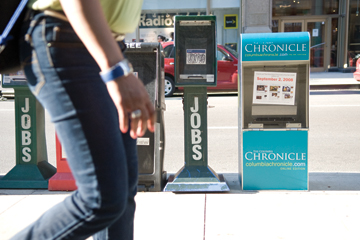Editor’s Note

Robert Bykowski THE CHRONICLE
April 21, 2014
I’ll never forget my parents’ reaction when I got up the nerve to tell them I wanted to go to Columbia. I had been thinking about it for a long time but always figured it just wouldn’t be possible—especially since my parents were dead-set on me going to state school at the University of Kansas.
Columbia is a far cry from KU, so I wasn’t surprised when they laughed in my face. A big part of it was the distance away from home and that it was a big city. But their concerns deepened when I explained that ACT scores weren’t required and the college had an “open admissions” policy. The exact wording escapes me, but their comments were somewhere along the lines of “So, it’s a hippie school that you found on the Internet that doesn’t rate students’ abilities by their grades or test scores? Where the heck do you find this stuff?”
I was eventually able to convince them to let me come to Columbia, and they’re now proud, Columbia apparel-wearing groupies. But the sentiment behind some of Columbia’s policies still says “hippie school” to many outsiders, current students, teachers and concerned parents of prospective students. And as the college tries to become the nation’s best arts college, the administration, and students, seem to still be struggling to balance Columbia’s original ideals with the desire to establish the college as a more competitive university.
The intense growth at Columbia in the past few decades is undeniable. Word is finally getting out that our students are the cream of the crop. Administrators are working to address concerns about how effective the “open” admissions policy was, and how it held the college, and its best students, back.
They argue that the renamed “generous” admissions policy dumbs down Columbia’s reputation and lowers expectations of its students. They argue that LAS classes are not challenging enough and do not provide students with a well-rounded education that other universities may offer. And they argue that without certain programs that have always been key elements of traditional universities—like an honors program, a healthy number of advanced courses and a two-year wait to enter programs of study—Columbia may never be taken seriously.
It’s not as if these are the students who just grumble and moan about every single thing they can, just to have something to complain about; they’re simply hungry for more at Columbia and more for Columbia.
And even though their concerns aren’t being ignored, they are, however, being challenged by the old Columbia regime. There’s a certain power struggle that exists, and has existed, within the college’s infrastructure between those who believe in the new ideals they think Columbia needs to adopt and those who are slightly married to the original ideals of the college—creativity can’t be measured by grades, the instructor isn’t the only “teacher” in a class, etc. It seems like the old regime is, ironically, fighting change, to some degree, that the new regime thinks would help the college move forward and progress. Create change? More like create catfights.
So, and I’ve learned this from my three years at Columbia, can’t we all just discuss this like adults and come up with a compromise? These two ways of thinking are mostly on opposite ends of the spectrum, but one doesn’t necessarily impede the other. If we implement an honors program, which could be similar to other universities’ programs but formed to best fit Columbia students, it won’t promote an elitist attitude—it would provide another avenue for dedicated, ambitious students hungry for a challenge to push themselves to their highest potential. If we look into establishing a two-year wait to enter programs of study, it won’t shut the door to students without work samples—it could be an opportunity for students to develop their skills more before diving headfirst into an area of study they are unfamiliar with, and often become jaded about, wasting both the teachers’ and the passionate students’ time.
We all had our own reason for picking Columbia. It’s becoming one of the most highly regarded arts colleges in the nation, it has a prime location for students in the arts, the curriculum taught is bar none the best—take your pick. It’s obvious that the college has done something right in the past few decades in embracing new methods to expand and grow for the best interest of the students.
We’re definitely on the right track to becoming a dominant force in arts education. Why not continue to work together, have an open dialogue about the future of the college and develop some compromises to keep creating change at the college?|
And while we’re at it, can we think about updating our motto a little? The “Create Change” shtick has become quite the mockery around campus.
I’m willing to compromise on this.







